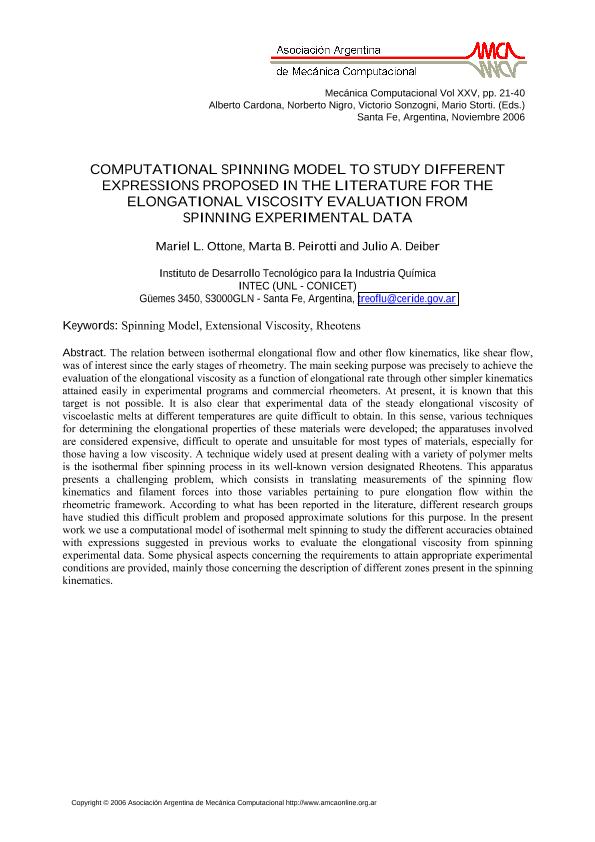Artículo
Computational Spinning Model to Study Different Expressions Proposed in the Literature for the Elongational Viscosity Evaluation from Spinning Experimental Data
Fecha de publicación:
12/2006
Editorial:
Asociación Argentina de Mecánica Computacional
Revista:
Mecánica Computacional
ISSN:
2591-3522
Idioma:
Inglés
Tipo de recurso:
Artículo publicado
Clasificación temática:
Resumen
The relation between isothermal elongational flow and other flow kinematics, like shear flow, was of interest since the early stages of rheometry. The main seeking purpose was precisely to achieve the evaluation of the elongational viscosity as a function of elongational rate through other simpler kinematics attained easily in experimental programs and commercial rheometers. At present, it is known that this target is not possible. It is also clear that experimental data of the steady elongational viscosity of viscoelastic melts at different temperatures are quite difficult to obtain. In this sense, various techniques for determining the elongational properties of these materials were developed; the apparatuses involved are considered expensive, difficult to operate and unsuitable for most types of materials, especially for those having a low viscosity. A technique widely used at present dealing with a variety of polymer melts is the isothermal fiber spinning process in its well-known version designated Rheotens. This apparatus presents a challenging problem, which consists in translating measurements of the spinning flow kinematics and filament forces into those variables pertaining to pure elongation flow within the rheometric framework. According to what has been reported in the literature, different research groups have studied this difficult problem and proposed approximate solutions for this purpose. In the present work we use a computational model of isothermal melt spinning to study the different accuracies obtained with expressions suggested in previous works to evaluate the elongational viscosity from spinning experimental data. Some physical aspects concerning the requirements to attain appropriate experimental conditions are provided, mainly those concerning the description of different zones present in the spinning kinematics.
Archivos asociados
Licencia
Identificadores
Colecciones
Articulos(INTEC)
Articulos de INST.DE DES.TECNOL.PARA LA IND.QUIMICA (I)
Articulos de INST.DE DES.TECNOL.PARA LA IND.QUIMICA (I)
Citación
Ottone, Mariel Lorena; Peirotti, Marta Beatriz; Deiber, Julio Alcides; Computational Spinning Model to Study Different Expressions Proposed in the Literature for the Elongational Viscosity Evaluation from Spinning Experimental Data; Asociación Argentina de Mecánica Computacional; Mecánica Computacional; XXV; 1; 12-2006; 21-41
Compartir




